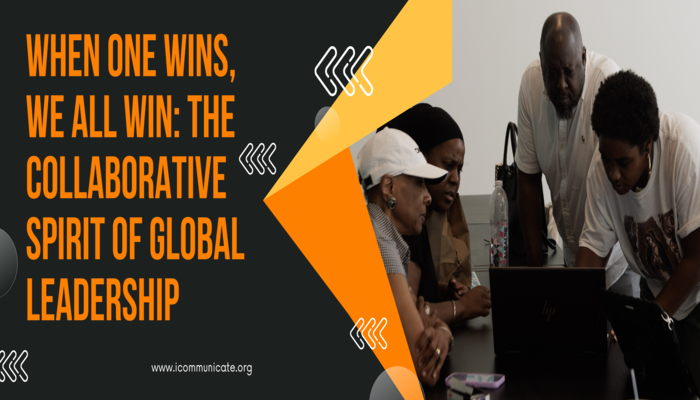When One Wins, We All Win: The Collaborative Spirit of Global Leadership
August 15, 2023 2023-08-15 18:55When One Wins, We All Win: The Collaborative Spirit of Global Leadership
I have always believed that our true access to the world working is only possible when we acknowledge our differences and work them out in a created and creative realm of leadership. This blog is designed to open up the authentic possibility of who we are as creatives, wayfarers, and life lovers – vastly different and yet the same in a world filled with unique cultures, customs, and traditions. Leadership is not a journey alone. It’s a symphony played together, affirming that when one wins, we all win. A dance that weaves together the wisdom of the ages, traditions, and continents. This blog is about “the dance.”
The Global Tapestry of Collaborative Leadership
Begin with the African principle of ‘Ubuntu, ‘ a word that resonates with the idea “I am because we are.” This philosophy, embraced by leaders like Nelson Mandela, emphasizes empathy, compassion, and the interconnectedness of all beings. It’s a concept that echoes across Africa and finds reflections in the distant islands of Hawaii, where the ‘Aloha Spirit’ signifies love, peace, and mutual respect.
Travel eastward and encounter the Japanese value of ‘Wa,’ where harmony and unity take precedence. Japanese leaders value alignment and group well-being, forging a path emphasizing cooperation and consensus-building. This communal spirit resonates with Scandinavian leadership, where flat organizational hierarchies and a focus on equality lead to a culture of collaboration and open dialogue.
Indian leadership philosophy, with its emphasis on ‘Seva’ or selfless service, takes this idea a step further. Leaders like Mahatma Gandhi personified humility and selflessness, viewing leadership as serving others. This servant leadership contrasts and complements the Japanese and Scandinavian models, painting a picture of leadership united and unified in purpose.
Finally, in the wisdom of Native American cultures, we find a philosophy of leadership rooted in stewardship, respect for the Earth, and a holistic view of life’s interconnectedness. Decisions arise with seven generations in mind, a profound expression of responsibility that aligns with the other philosophies we have mentioned.
These diverse but connected threads of leadership weave a tapestry that is both beautiful and instructive. Whether it’s African Ubuntu, Japanese Wa, Hawaiian Aloha, Scandinavian consensus, Indian servant leadership, or Native American stewardship, the standard narrative is straightforward. Leadership is about unity, empathy, and collaboration.
Collaborative Wins in Action: The Dance of Success
Authentic leadership, when unbound, has an omnipresent stride – a dance that seems as if it can fill whole galaxies. In collaborative triumphs, we find real-world echoes of the philosophies explored earlier. Consider the International Space Station (ISS), a magnificent example of global collaboration, reflecting the Japanese principle of ‘Wa’ or harmony. Here, astronauts from various nations work seamlessly, embodying unity and group well-being, all in pursuit of a common goal of exploration.
In the worldwide battle against diseases, the Bill & Melinda Gates Foundation embodies the Indian philosophy of ‘Seva’ or selfless service. They focus on improving healthcare and reducing extreme poverty globally through partnerships with governments, NGOs, and other foundations. This collective effort, transcending borders and differences, embodies the essence of servant leadership.
The global response to climate change resonates with the wisdom of Native American stewardship and African “Ubuntu.” Here, countries come together to protect the Earth by considering future generations, which honors the seven generations philosophy.
Meanwhile, Ubuntu’s shared responsibility and interconnectedness get expressed in international agreements recognizing the global nature of environmental challenges.
The Scandinavian model of equality and collaboration in business and innovation inspires partnerships and joint ventures that break new ground. Startups and corporations are finding value in collaborative efforts, an alignment that echoes the open dialogue and consensus-building found in Scandinavian leadership.
From space exploration to global health, environmental protection to business innovation, these examples weave the threads of global leadership philosophies into a vibrant tapestry of collaborative wins.
Why Collective Leadership Matters More Than Ever: A Dance of Destiny
But let us not be dismissive! Humanity’s problems have existed for thousands of years, leading to widespread cynicism and hysteria. In today’s complex world, where challenges transcend borders, the dance of leadership has never been more significant. We live in an era where no nation, culture, or individual can tackle our global challenges alone. Collective leadership is not a mere option; it is a necessity.
The global economy is interconnected, and the problems we face intertwine. Climate change, poverty, inequality, and disease do not recognize borders. These issues demand a unified response, where leaders from different nations, cultures, and backgrounds come together, guided by a shared vision.
The concept of leadership itself has evolved. It’s no longer about a single charismatic individual leading the way. It’s about communities, networks, and collective wisdom. It’s a dance of destiny where diverse voices converge, bringing unique perspectives and solutions.
This convergence materializes in international treaties, cross-border initiatives, and collaborative projects that address common goals. The spirit of collaboration reflects the cultural philosophies we’ve explored, from the harmony of ‘Wa’ to the selflessness of ‘Seva.’
Our shared humanity and interconnected fates call us to rise above narrow interests, recognizing that our destinies are linked. The future belongs to those who understand that when one wins, we all win. It is a dance we must all join, a symphony we must all play, a journey we must all undertake together. For in unity, we find strength; in collaboration, we find success; and in empathy, we see the essence of authentic leadership.
Conclusion: Embracing Our Shared Triumphs
“Our destinies” is a flawed concept. There is only one destiny, and we all share it as a species. Leadership is not about solitary victory but a communal celebration, a reminder that when one wins, we all win.
The quotes and philosophies from various cultures illuminate one truth: our destinies are intertwined. When one person or nation achieves greatness, it uplifts us all. As the Maori proverb goes, “Whāia te iti kahurangi ki te tūohu koe me he maunga teitei” (Pursue excellence – should you stumble, let it be to a lofty mountain).
Let’s get to dancing!
Jean Lloyd, Cultural Architect


